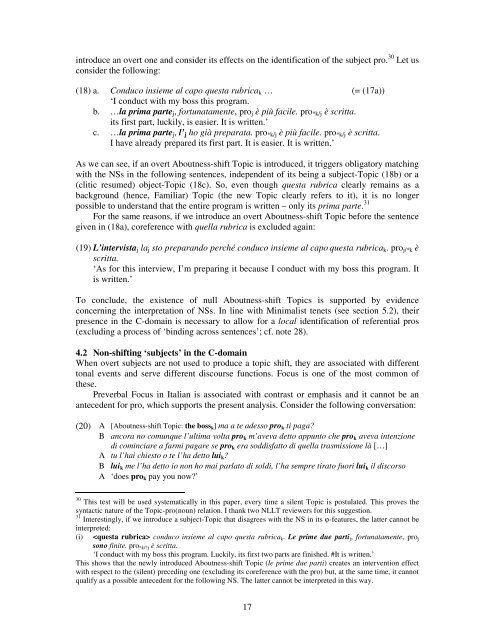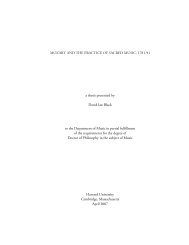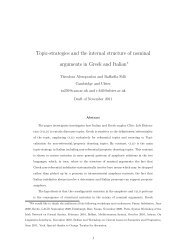Subjects, Topics and the Interpretation of Referential pro.
Subjects, Topics and the Interpretation of Referential pro.
Subjects, Topics and the Interpretation of Referential pro.
You also want an ePaper? Increase the reach of your titles
YUMPU automatically turns print PDFs into web optimized ePapers that Google loves.
introduce an overt one <strong>and</strong> consider its effects on <strong>the</strong> identification <strong>of</strong> <strong>the</strong> subject <strong>pro</strong>. 30 Let us<br />
consider <strong>the</strong> following:<br />
(18) a. Conduco insieme al capo questa rubricak … (= (17a))<br />
‘I conduct with my boss this <strong>pro</strong>gram.<br />
b. …la prima partej, fortunatamente, <strong>pro</strong>j è più facile. <strong>pro</strong>*k/j è scritta.<br />
its first part, luckily, is easier. It is written.’<br />
c. …la prima partej, l’j ho già preparata. <strong>pro</strong>*k/j è più facile. <strong>pro</strong>*k/j è scritta.<br />
I have already prepared its first part. It is easier. It is written.’<br />
As we can see, if an overt Aboutness-shift Topic is introduced, it triggers obligatory matching<br />
with <strong>the</strong> NSs in <strong>the</strong> following sentences, independent <strong>of</strong> its being a subject-Topic (18b) or a<br />
(clitic resumed) object-Topic (18c). So, even though questa rubrica clearly remains as a<br />
background (hence, Familiar) Topic (<strong>the</strong> new Topic clearly refers to it), it is no longer<br />
possible to underst<strong>and</strong> that <strong>the</strong> entire <strong>pro</strong>gram is written – only its prima parte. 31<br />
For <strong>the</strong> same reasons, if we introduce an overt Aboutness-shift Topic before <strong>the</strong> sentence<br />
given in (18a), coreference with quella rubrica is excluded again:<br />
(19) L’intervistaj laj sto prepar<strong>and</strong>o perché conduco insieme al capo questa rubricak. <strong>pro</strong>j/*k è<br />
scritta.<br />
‘As for this interview, I’m preparing it because I conduct with my boss this <strong>pro</strong>gram. It<br />
is written.’<br />
To conclude, <strong>the</strong> existence <strong>of</strong> null Aboutness-shift <strong>Topics</strong> is supported by evidence<br />
concerning <strong>the</strong> interpretation <strong>of</strong> NSs. In line with Minimalist tenets (see section 5.2), <strong>the</strong>ir<br />
presence in <strong>the</strong> C-domain is necessary to allow for a local identification <strong>of</strong> referential <strong>pro</strong>s<br />
(excluding a <strong>pro</strong>cess <strong>of</strong> ‘binding across sentences’; cf. note 28).<br />
4.2 Non-shifting ‘subjects’ in <strong>the</strong> C-domain<br />
When overt subjects are not used to <strong>pro</strong>duce a topic shift, <strong>the</strong>y are associated with different<br />
tonal events <strong>and</strong> serve different discourse functions. Focus is one <strong>of</strong> <strong>the</strong> most common <strong>of</strong><br />
<strong>the</strong>se.<br />
Preverbal Focus in Italian is associated with contrast or emphasis <strong>and</strong> it cannot be an<br />
antecedent for <strong>pro</strong>, which supports <strong>the</strong> present analysis. Consider <strong>the</strong> following conversation:<br />
(20) A [Aboutness-shift Topic: <strong>the</strong> bossk] ma a te adesso <strong>pro</strong>k ti paga?<br />
B ancora no comunque l’ultima volta <strong>pro</strong>k m’aveva detto appunto che <strong>pro</strong>k aveva intenzione<br />
di cominciare a farmi pagare se <strong>pro</strong>k era soddisfatto di quella trasmissione là […]<br />
A tu l’hai chiesto o te l’ha detto luik?<br />
B luik me l’ha detto io non ho mai parlato di soldi, l’ha sempre tirato fuori luik il discorso<br />
A ‘does <strong>pro</strong>k pay you now?’<br />
30<br />
This test will be used systematically in this paper, every time a silent Topic is postulated. This <strong>pro</strong>ves <strong>the</strong><br />
syntactic nature <strong>of</strong> <strong>the</strong> Topic-<strong>pro</strong>(noun) relation. I thank two NLLT reviewers for this suggestion.<br />
31<br />
Interestingly, if we introduce a subject-Topic that disagrees with <strong>the</strong> NS in its φ-features, <strong>the</strong> latter cannot be<br />
interpreted:<br />
(i) conduco insieme al capo questa rubricak. Le prime due partij, fortunatamente, <strong>pro</strong>j<br />
sono finite. <strong>pro</strong> *k/*j è scritta.<br />
‘I conduct with my boss this <strong>pro</strong>gram. Luckily, its first two parts are finished. #It is written.’<br />
This shows that <strong>the</strong> newly introduced Aboutness-shift Topic (le prime due parti) creates an intervention effect<br />
with respect to <strong>the</strong> (silent) preceding one (excluding its coreference with <strong>the</strong> <strong>pro</strong>) but, at <strong>the</strong> same time, it cannot<br />
qualify as a possible antecedent for <strong>the</strong> following NS. The latter cannot be interpreted in this way.<br />
17
















